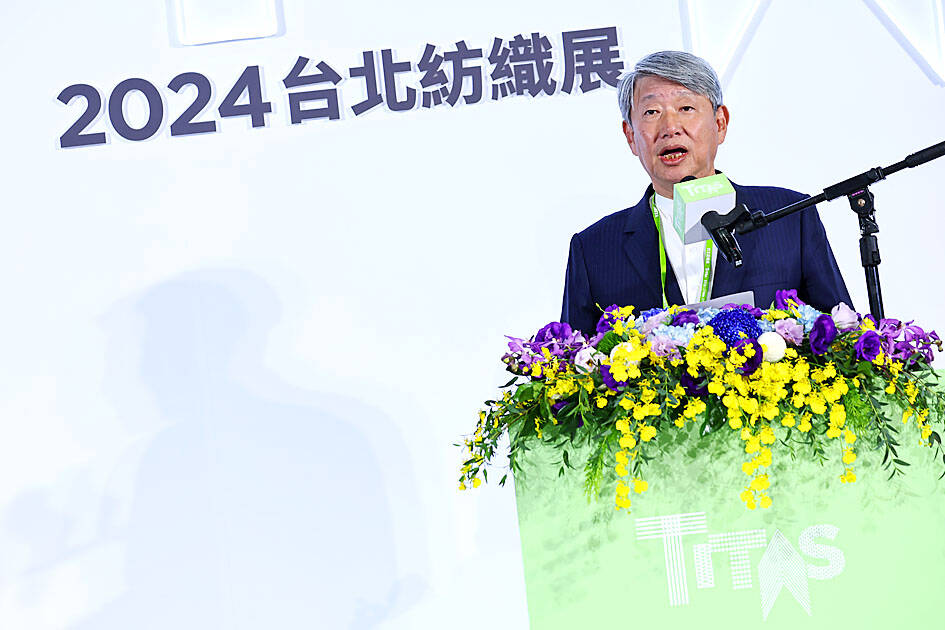Taiwan is considering setting up renewable power plants in neighboring countries, such as the Philippines, and transporting the electricity back home to meet the green power needs of Taiwanese manufacturers, Minister of Economic Affairs J.W. Kuo (郭智輝) said yesterday.
“The green power could be brought back via ships or submarine cables,” the Chinese-language Liberty Times (the Taipei Times’ sister newspaper) quoted Kuo as saying on the sidelines of the annual Taipei Innovative Textile Application Show at the Taipei Nangang Exhibition Center.
As local governments and residents frequently differ in opinion about constructing new power plants, and it takes time to communicate and bridge the differences, the Ministry of Economic Affairs has to find a way to meet the nation’s industrial development and carbon reduction goals, as manufacturers needing green power cannot afford to wait, Kuo said.

Photo: CNA
While deliberations on this idea are still in the early stage, Kuo touted the substantial benefits of building renewable power plants abroad.
First, it would address the problem of setting up new power plants in Taiwan, and second, the imported green power would be cheaper than renewable energy developed in Taiwan, he said.
As Taiwan is in the process of shutting down its nuclear power plants and the government has pledged to cut carbon emissions and achieve net zero by 2050, the nation’s demand for green energy would only grow, he said.
Kuo added that the idea of building power plants abroad was inspired by Singapore, which plans to import power from Australia, which is about 4,800km away.
It should therefore not be a problem for Taiwan to establish a green power plant on the Philippine island of Luzon, which is about 300km away, he said.
There are three types of green power that can be developed in the Philippines: solar, wind and geothermal, he said.
“We will look for a neighboring country that offers resources where we can develop green power, and we will encourage Taiwanese firms, not necessarily state-run Taiwan Power Co (台電), to build the power plants there,” before bringing the energy back to Taiwan, Kuo said.
The minister added that American Institute in Taiwan Director Raymond Greene would assist Taiwan in finding suitable locations for overseas power plants, including the Philippines and Japan.
Kuo first shed light on building renewable power plants in the Philippines on Monday night when he attended the launch of the Indo-Pacific Strategic Thinktank in Taipei.
He added that Taiwan hopes to contribute to the Luzon Economic Corridor launched by the US, Japan and the Philippines earlier this year to boost regional development.
However, experts said that building a submarine cable between Taiwan and the Philippines could present challenges, including time and cost.

US President Donald Trump yesterday announced sweeping "reciprocal tariffs" on US trading partners, including a 32 percent tax on goods from Taiwan that is set to take effect on Wednesday. At a Rose Garden event, Trump declared a 10 percent baseline tax on imports from all countries, with the White House saying it would take effect on Saturday. Countries with larger trade surpluses with the US would face higher duties beginning on Wednesday, including Taiwan (32 percent), China (34 percent), Japan (24 percent), South Korea (25 percent), Vietnam (46 percent) and Thailand (36 percent). Canada and Mexico, the two largest US trading

AIR SUPPORT: The Ministry of National Defense thanked the US for the delivery, adding that it was an indicator of the White House’s commitment to the Taiwan Relations Act Deputy Minister of National Defense Po Horng-huei (柏鴻輝) and Representative to the US Alexander Yui on Friday attended a delivery ceremony for the first of Taiwan’s long-awaited 66 F-16C/D Block 70 jets at a Lockheed Martin Corp factory in Greenville, South Carolina. “We are so proud to be the global home of the F-16 and to support Taiwan’s air defense capabilities,” US Representative William Timmons wrote on X, alongside a photograph of Taiwanese and US officials at the event. The F-16C/D Block 70 jets Taiwan ordered have the same capabilities as aircraft that had been upgraded to F-16Vs. The batch of Lockheed Martin

China's military today said it began joint army, navy and rocket force exercises around Taiwan to "serve as a stern warning and powerful deterrent against Taiwanese independence," calling President William Lai (賴清德) a "parasite." The exercises come after Lai called Beijing a "foreign hostile force" last month. More than 10 Chinese military ships approached close to Taiwan's 24 nautical mile (44.4km) contiguous zone this morning and Taiwan sent its own warships to respond, two senior Taiwanese officials said. Taiwan has not yet detected any live fire by the Chinese military so far, one of the officials said. The drills took place after US Secretary

THUGGISH BEHAVIOR: Encouraging people to report independence supporters is another intimidation tactic that threatens cross-strait peace, the state department said China setting up an online system for reporting “Taiwanese independence” advocates is an “irresponsible and reprehensible” act, a US government spokesperson said on Friday. “China’s call for private individuals to report on alleged ‘persecution or suppression’ by supposed ‘Taiwan independence henchmen and accomplices’ is irresponsible and reprehensible,” an unnamed US Department of State spokesperson told the Central News Agency in an e-mail. The move is part of Beijing’s “intimidation campaign” against Taiwan and its supporters, and is “threatening free speech around the world, destabilizing the Indo-Pacific region, and deliberately eroding the cross-strait status quo,” the spokesperson said. The Chinese Communist Party’s “threats